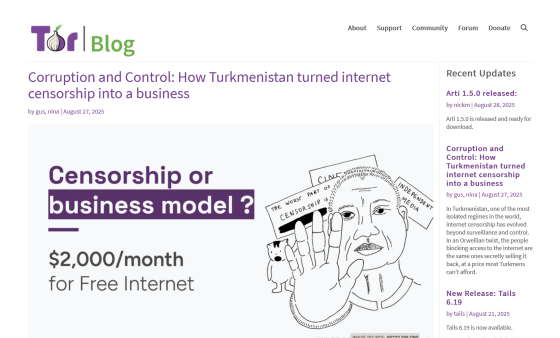Turkmenistan's strict internet censorship authorities are selling expensive VPN services to citizens, turning censorship into 'profitable extortion'

Corruption and Control: How Turkmenistan turned internet censorship into a business | The Tor Project
https://blog.torproject.org/Corruption-Control-Turkmenistan-internet-censorship-business/

Modern censorship circumvention systems, including Tor, are generally based on the idea that censors can only block parts of the internet because blocking most of it would cause too much damage. However, in Turkmenistan, censors are openly blocking large parts of the internet, without regard for collateral damage.
The Tor Project points out that before considering internet censorship in Turkmenistan, it is important to understand the current situation in the country. Turkmenistan is a former Soviet republic with a population of approximately 6 million. Since gaining independence in 1991, it has been governed by a repressive totalitarian dictatorship. In Reporters Without Borders ' 2025 Press Freedom Index , Turkmenistan ranks 174th out of 180 countries, with widespread corruption throughout the government and one of the lowest internet penetration rates in the world.
Human rights violations, such as child labor in cotton fields and the imposition of dress codes for women, are systematically committed, but few activists speak out about what is happening in the country for fear of heavy-handed government crackdowns. An activist and blogger living in Turkey was deported to Turkmenistan , and journalist Soltan Akilova was nearly poisoned by authorities while attempting to travel to Switzerland for the Martin Ennals Prize, a global human rights award.

Turkmenistan has consistently restricted internet access since the country's inception. The country's communications sector is owned by the state itself or by individuals connected to the ruling class.
While it is difficult to measure internet censorship from within Turkmenistan, a 2022 study using a methodology that does not rely on on-site testing confirmed the existence of over 183,000 blocking rules and over 122,000 censored domains.
In 2023, Turkmen.news, a news outlet in Turkmenistan, reported that an employee of Turkmenistan's Cybersecurity Agency, which is responsible for internet censorship, was offering paid VPN and IP address unblocking services as a side job.
'Not only were they profiting from internet oppression, they were creating demand,' the Tor Project said in a blog post. 'In other words, blocking Tor wasn't just a matter of national security or ideology, it was a way to create a profitable niche for the cybersecurity sector itself. The very people who blocked access were then selling that access back.'

Internet censorship was relaxed for several months in mid-2024, with large-scale IP address blocks being lifted and access to censorship circumvention services, including Tor, becoming available. However, this so-called 'internet amnesty' did not last long, and internet censorship was reinstated in December of the same year.
By April 2025, authorities confirmed the resurgence of their grey VPN business. VPN keys were being sold for around $50 per month, with cheaper weekly plans also available, but music and video streaming services were often unavailable. Furthermore, a service was reportedly offering all filters removed for $2,000 per month.
The Tor Project argued, 'What is called 'cybersecurity' in other countries is the exact opposite in Turkmenistan: deliberate disruption of internet connectivity to sustain profitable illicit activities. This is not just a case of censorship; it is state-sponsored extortion, with the censors as traffickers. Cybersecurity bureau officials use surveillance and control tools to operate a corruption scheme that extracts money from a population already subject to the control of an authoritarian government.'
in Web Service, Posted by log1h_ik